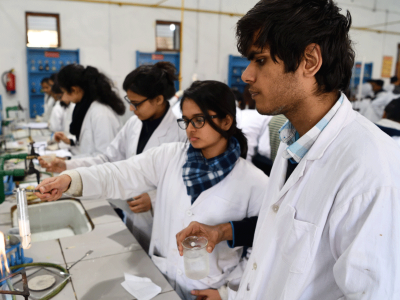
Podcasts offer a quick way to publish research results.Credit: grinvalds/iStock via Getty
Kate Murray, a communications specialist in Melbourne, Australia, wants to see peer-reviewed research published as podcasts.
It’s a “fairly fledgling concept”, says Murray, who helps to produce Walking the city with…, a podcast series that follows scholars as they visit locations that are important to their research and discuss topics such as urban policy, planning and culture.
Published by the journal Urban Studies last year, Walking the city with… was edited and peer reviewed using the same process that paper submissions undergo, the journal states.
As one of only a few examples of peer-reviewed podcasts so far, Walking the city with… demonstrates the value that an audio medium can bring to the scientific literature, says Murray.
For example, podcasts are a lot faster to produce than an academic paper, she says, which could be useful in circumstances such as public-health emergencies, when researchers want to get their findings out as quickly as possible.
It could also be beneficial for scholars for whom English is not their first language, says Murray. Some academics, particularly early-career researchers, might feel more comfortable speaking and being interviewed about their research than trying to write a technical paper in English, she adds. “Relaying your work in your own authentic voice and being heard is empowering,” she says.
A new model
Podcasts hosted by academics are as old as podcasting itself. StarTalk, hosted by astrophysicist Neil deGrasse Tyson and various co-hosts, is a popular example. But podcasts made by and peer reviewed by researchers and published as a contribution to the scientific record represent a much newer model.
Each episode of Walking the city with… features Michele Acuto, the managing editor of Urban Studies, interviewing urban scientists in various city locations, such as gardens, parks and cemeteries. The voice recordings mingle with ambient noises on a city street to bring contextual information that is difficult to get across in a written account, Murray says.
“We didn’t want our peer-reviewed podcast to just be a spoken version of a journal article,” says Murray. “So, we decided to take researchers who study urban environments for a walk in places that relate to their areas of interest, to immerse them in the environment.”
In the first episode, Colin McFarlane, who studies urban geography at Durham University, UK, walks around London and compares its ambience with that of Glasgow, UK, and Mumbai and Delhi in India. McFarlane reflects on how high-density living and crowds can feel completely different from one city to another, and explores how poor infrastructure and sanitation can cause health problems that erode participation in city life.
“Because the researchers were walking and talking in place, it helped them to draw connections across their research and had us, as listeners, being present while they came up with new ideas — and that was very exciting to listen to,” says Murray.
Incorporating feedback
How best to incorporate changes on the basis of the reviewers’ feedback is something that proponents of peer-reviewed podcasts are still mulling over.
“Most scholars are much more experienced editing text than sound,” says Hannah McGregor, a communications researcher at Simon Fraser University in Vancouver, Canada, who developed a peer-review process for a podcast called Secret Feminist Agenda, in collaboration with its publisher, Wilfrid Laurier University Press (WLUP), based in Waterloo, Canada. “Because peer reviewing podcasts is a new process, were still figuring out what kinds of approaches we can use.”

2024 Research Leaders
Murray and her team didn’t want to re-record the field interviews to make changes. “The more you switch audio quality and audio types, the more work it is for the listener to engage,” she says. Instead, she and her team incorporated studio recordings where needed, using contributions from Acuno and Caitlin Morrissey, a PhD candidate researching urban transport at the University of Melbourne, who act as co-hosts.
For Secret Feminist Agenda, McGregor and her team took a different approach: they published the podcasts first, and then released the peer-review comments alongside them online. The team did not return to the episodes and edit them in response to reviewer feedback, but the feedback did inform future episodes, says McGregor.
In another three-part series, called Why Podcast?: Podcasting as Publishing, Sound-Based Scholarship, and Making Podcasts Count, published by the online journal Kairos, McGregor and her colleagues included an extra episode in which the peer-review results were discussed. In WLUP’s upcoming podcast, Community of Praxis, the team plans to take an approach similar to the one Murray and her colleagues used, with episodes being recorded, reviewed and edited before publication.
“It’s important to resist a one-size-fits-all approach,” says McGregor. “Traditional peer review has been rightfully criticized in recent years for being time-consuming, exploitative, gatekeeping and ineffective at identifying errors. Podcasting offers an opportunity to rethink why we’re doing peer review in the first place and how we might reimagine the process.”


